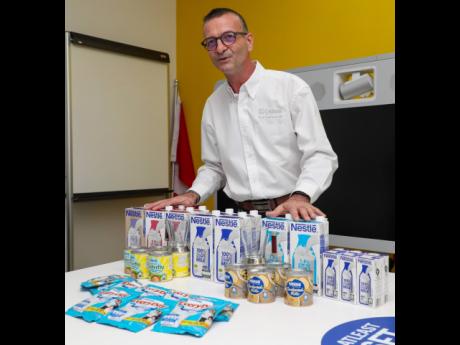Nestlé Ja back in the dairy market
FOOD COMPANY Nestlé Jamaica Limited is back in the dairy market as a distributor of whole milk products made on its behalf under a contract- packaging deal with Seprod Limited.
The Swiss-owned company had all but exited that line of business more than four years ago, when it sold off its Bog Walk dairy business to the Musson Group in November 2015. Nestlé also sold the rights to the Betty condensed milk and Supligen food drink brands, closing the chapter on its more than 75 years of manufacturing in the Jamaican marketplace.
Its operations were refocused around distribution only of Nestlé brands from a newly developed complex at Ferry in Kingston, on which the food company spent US$12 million. Its distribution portfolio spans more than 200 products.
Meantime, in a series of transactions, Seprod, which is a member of the Musson Group, took operational control of the diary operations that Nestlé previously owned at Bog Walk in St Catherine. Seprod later took over ownership of the assets and business, which were subsequently consolidated with its own Serge Island Dairies subsidiary.
Nestlé Jamaica Country Manager Daniel Caron said the company had to respect the legal agreements of the sale contract, but was now in a position to re-enter the dairy market. He would not say what had changed to make the re-entry possible, but noted it had been a personal goal of his.
“Before this we were just into cereals; now, with the addition of milk, we create value by way of brand extension and synergies,” Caron told the Financial Gleaner in an interview at the company’s Ferry Pen hub.
The complex sits on 6.3 acres and houses Nestlé’s corporate offices, warehousing and distribution operations, laboratories and test kitchens, and a lifestyle centre for staff. The company employs 200 workers, plus an additional 60-70 contractors.
Caron says the big co-packing agreement with Seprod, struck in mid-2019, is part of Nestlé Jamaica’s strategic realignment to go after more regional markets.
“Basically, we’ve come full circle, because we’re bigger now than when we sold the business four years ago; and we have a hub operation from where we can service 23 countries,” he said.
Nestlé previously sold whole milk products in Jamaica, but the brand was absent from the shelves for more than four years.
High duties on imports
Nestlé Anglo/Dutch Caribbean owns a milk factory in Trinidad, says Caron, who indicated that the Jamaican operation chose to do a co-packaging deal with a local manufacturer instead of buying products from a sister regional operation, because of the high duties it would face to import the products for distribution.
He said Jamaican law effectively prevents Nestlé from importing milk, and in the case of milk powder, the company “would have to pay over 60 per cent aggregate duty, – which doesn’t make sense,” he charged.
Asked about the co-packing deal with a rival outfit, and what it meant for the Serge brand and other milk products produced by the Seprod Group, CEO Richard Pandohie says their calibration went beyond the potential competition and implications for market share.
“This co-manufacturing relationship with Nestlè, the number-one food company in the world, is a win for us but equally important, it could serve to catalyse a revival of the dairy industry,” Pandohie said.
Seprod also weighed the fact that Nestlè appeared more focussed on growing regional sales, and what that could mean for reclaiming market share from extra-regional suppliers.
“If we grow the local dairy industry, then we will be able to supply the other Caricom markets, many of which are importing fresh milk from Europe,” Pandohie noted.
Caron says since taking over as at Nestlé Jamaica four years ago, he had set a personal goal to find a way to reintroduce a wide range of whole milk and other milk products to the Jamaican market.
“In Jamaica, we have over 200 products ranging from Maggi to Milo, breakfast cereal, and everything besides and between. Yet a staple like milk was not in the line-up,” Caron said, while noting he was looking beyond Jamaica for whole milk brand presence.
“With this co-packaging arrangement, we get to sell milk products not only to Jamaica, but 23 other countries in the region. With this UHT (ultra-high temperature) packaging, I have the same look and the same flavour profile all throughout the Caribbean, making me the number-one supplier,” Caron said of Nestlé Jamaica’s strategic plans.
He is gunning for 10 per cent of the local market in the short term and consolidating Nestlé’s market position within the Caribbean.
Its dairy line now includes 0.5% fat free, 1.5% low-fat and full-cream milk UHT products, in addition to Nestlé Everyday powdered milk in sachets. The company is also bringing back Nestlé full cream condensed milk and adding the Butterfly half-cream condensed milk to its dairy line.
Caron did not disclose the size of the investment, but noted that most of the spend would surround marketing and placement of the products.
“It took very little investment; rather, the real investment will come with the brand building. My budget is 11 per cent of my sales. That is what I want to put behind the brands and grow the business,” he said.

